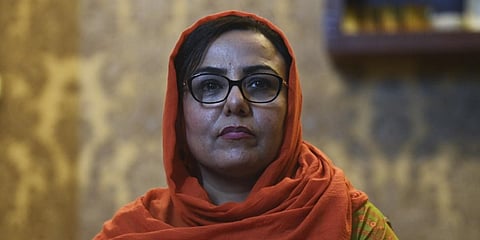

KOLKATA: The international community, particularly the US, has given the Taliban a platform and the recognition it needed to regain power in Afghanistan, says Afghan Women Network executive director Mary Akrami, describing the situation for women in her country as "scary".
While disappointed and despairing at the silence of the global community, Afghans are hopeful India will be a peacemaker and stand by them in the crisis, Akrami added in a phone interview from Kabul. "India should play the role of a good neighbour, a mediator. And they should stand beside the people of Afghanistan. As a woman, as a human being, I will advise the Indian government to play the role of a peacemaker," she said.
"But first of all, India and Pakistan must solve their problems because Afghanistan has suffered a lot due to the issues between them," she told PTI as the Taliban consolidated its hold after a swift offensive through the war-ravaged country following the departure of American-led forces.
The Taliban took control of Kabul on Sunday evening, capturing power 20 years after a US-led military invasion ousted it in the aftermath of the 9/11 attacks. As Taliban insurgents overran the Afghanistan capital, thousands of people, including Afghans, diplomats and even President Ashraf Ghani and his entourage, fled the country.
"The international community, particularly the US, has given the Taliban a platform, space and the recognition to regain power in Afghanistan. Suddenly, giving this much of a platform to the Taliban was one of the biggest mistakes of the US government. None of the neighbouring countries, nor anybody in the world, have raised any objection to that," Akrami said.
Giving an insight into what's happening on the ground, Akrami said the current situation is "scary for women". There have been several incidents of women stepping outside their homes without a 'mahram' (group of escorts) being beaten on the streets, even if they are going to a health centre.
"Shops are banned from selling goods to women without a 'mahram'. The Taliban have ordered people to feed its fighters, otherwise face punishment," Akrami said.
She said the Islamic insurgents -- who follow a strict, ultra-orthodox patriarchal code for women -- have given orders to village elders and 'mullahs' to identify girls above age 15 and widows below age 45 to marry their fighters. "The Taliban have told working women here they cannot go to their offices," Akrami said, adding that listening to music or watching television have been banned.
Akrami, who is also founder of a women's shelter in Kabul, said she feared women's lifelines would be snatched away from them with the Taliban returning to power. She also questioned the "silence" of the United Nations as well as global superpowers and countries such as India and Iran at a time her country is going through a crisis as acute as this.
"It's not only our fight, it's the fight of the entire world...It's a time when I believe all countries must unite. Why is the UN so quiet with regard to Afghanistan? There are countries like India, Iran who are not supporting the Taliban, but are they still silent.
"I do not understand the reason behind this attitude. If a terrorist group comes and occupies Afghanistan, it is actually not good for our neighbouring countries, nor for the world. We have been suffering for the last 50 years and we do not want our neighbours to suffer like us," she said.
Akrami, a former executive director of the Afghan Women Skills Development Centre (AWSDC), also saw conspiracies behind the sudden rise of the Taliban and held countries such as Yemen, Syria and Sudan apart from Pakistan responsible.
"The reasons for the rise of the Taliban in Afghanistan are very complicated. All these years they (Taliban) were never powerful enough to occupy the country. It's only that Pakistan has supported them, but they also seem to have the backing of Sudan, Syria and Yemen," she said.
After each night there is a dark day, Akrami said when asked what the future holds for Afghanistan.
"We have a bumpy road ahead of us. We will face dark days and difficult days. But we will come out of this situation stronger and more committed to human rights values and to peace and justice. I am determined we will pass this test. After all, we are Afghans...we are brave, humble, kind and hard working people. After each dark night there is a bright day. We will rebuild our country," she said.
Akrami, who has been providing shelter to Afghan women abused and tortured by people either from their families or from society, also said they were ready to "make peace with the Taliban". "We are very tired of war and we want to make peace with the Taliban if they are really Afghans. But if there are other groups who are trying to identify themselves as Taliban in the name of supporting them, then the people of Afghanistan will not support them," she said.
The Taliban, she asserted, has to accept today's Afghanistan. "It's not the same country it was 20 years ago. Today's Afghanistan is about the youth, about the women who do not want to go back to the dark days. The Taliban have to respect the people...they have to change their policies and way to talk with the people of the country," Akrami said.
On whether she would want International forces to be back in Afghanistan to regain peace and power driving away the Taliban, Akrami said, "We will count on the UN peace special forces. They should come. We do not want any other countries to come and occupy our country. No one has the right to come and occupy Afghanistan. But, definitely, we need global support at the moment."